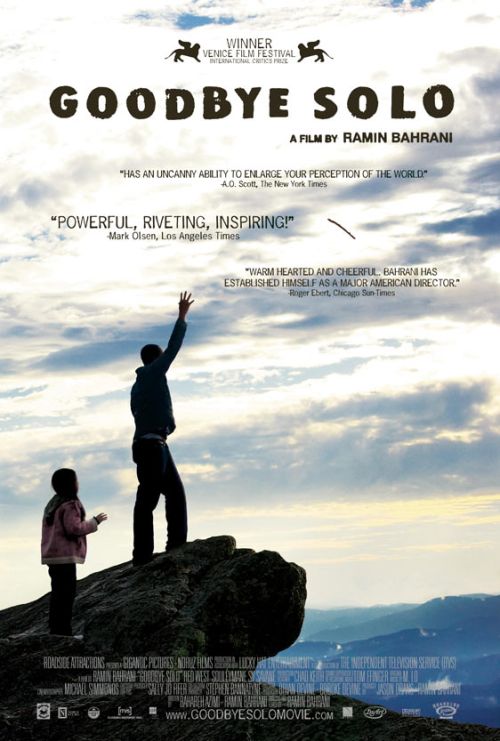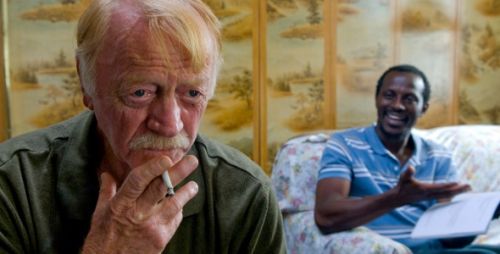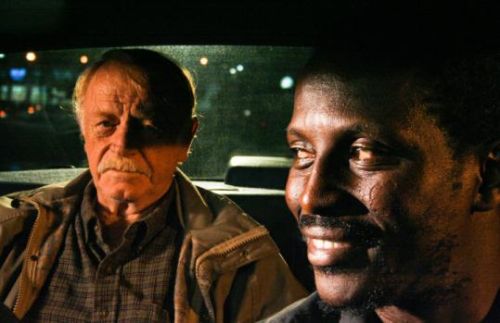'New' Irish Cinema - The Paradox of 'Turning Green'

You know, we like to be friendly round here, but if you've been in the neighbourhood for any length of time, you'll also know that I often grieve the lack of imagination in most films. Robots kill some people/people kill more robots; abs-ridden guy meets cute girl/conflict/unification; bloke changes, you know the deal. So it's a pleasant surprise to see 'Turning Green', your none-too-typical American boy grows up in a small West of Ireland village/competes with the local gangster by selling porn magazines (illegal in the eyes of the State and shameful in the eyes of the Church)/and makes witty comments about what's wrong with the land of my birth while Timothy Hutton, an actor I like a great deal, snarls at him from under a pork pie hat.
'Turning Green' was made four years ago - a runner up in the first season of 'Project Greenlight' - and is only now being released, with the absurdly misleading poster above. To tell you the truth, it's one of the strangest films I've seen - on the one hand trying to make a decent job of assessing Ireland's paradox, or at least its paradox thirty years ago, when the film is set: the fecund literary culture and freedom narratives of Beckett, Joyce, and Heaney co-mingling with the obsessive puritanism enshrined by the State; on the other, it offers a series of cliches about 'Oirishness' - the angry priest, the aul fella who seems glued to the end of the bar, the visions of Mary turned into a kind of foreplay. It doesn't help that the movie seems unsure of its tone - is it a dramatic entertainment in the tradition of 'The Quiet Man', a comedy in the style of 'Waking Ned', or a gangster thriller that should have been re-titled 'Mystic O'River'? You get parts of all three here; with a shade or two of Tarantino, and a little Woody Allen neurotic cynicism in the voiceover.
Writer-directors John G Hoffman and Michael Aimette do enough to make this northern Irish writer laugh - sometimes; but also enough to make me feel condescended to, sometimes. Ireland has been poor, sure; Ireland has been oppressive for some, absolutely; Ireland has a long string of little villages where everybody knows everybody else, of this there is no doubt. But the lack of any empathetic characters in 'Turning Green' has the effect of suggesting there's no reason to care; and for me, Ireland needs a vision of what we can be, rather than yet more dwelling on what's wrong with us.
And yet, I found myself almost beguiled by the depiction of my home; and grateful that I wasn't watching another 'Troubles' film or a 'Ryan's Daughter'-style over-romanticisation - there's a smart little film trying to escape from 'Turning Green', one in which the double standard of moral hypocrisy is the heart of the story. It's not a stretch to say that cultures that freak out over nudity while people are being killed in their name need a mirror; 'Turning Green' offers a very blunt one in an exchange of dialogue that, for me, was worth the weaknesses of the rest of the movie. When an old man is having trouble describing the package he's gone to pick up from the post office, the domineering priest in line behind our anti-hero James (played with appropriate detachment by Donal Gallery) huffs and puffs about how ridiculous it is to be wasting his time. James responds with a line that one imagines was the writers' intended motto for the whole film:
'If these people aren't bombing women and children or starving the homeless, they're making small talk at the post office'.
Despite the fact that the film doesn't hang together, glimpses of this coruscating raised eyebrow can be seen throughout; 'Turning Green' seems not be a complete work, but it has signs of moving in the right direction. And it's a better film than I'd make right now. (For what it's worth, 'Turning Green' pales in comparison to another film that carries similar themes - the far superior 'Garage', Lenny Abrahamson's Tarkovskian/Rohmeresque film about an Irish petrol station attendant and the encroachment of the Celtic Tiger.)
Meantime, in other Irish news, 'Prods and Pom-Poms', the lovely short documentary about Sandy Row cheerleaders will get its local TV debut for Northern Ireland viewers tomorrow night - you can see it on UTV at 10.35pm, Friday 6th November; and if you're outside the reach of northern Irish television transmitters, DVDs are still available from its makers.



 So I was up early this morning having slept restlessly after watching the end of 'Battlestar Galactica' last night (no spoilers - suffice it to say that fans of Richard Dawkins and Thomas Merton may find themselves both satisfied; I certainly was). Cylons colonised my repose (for some reason the early models, one of whose bosses is depicted above, were the stuff of my childhood nightmares), but I managed to avoid the bad dream I might otherwise have had when I was younger and less apt to resist imagining the imminent doom of the planet. I have a sensitive constitution, as they say. Which segues neatly into the reason for this post: why I am about to let you, dear reader, down.
So I was up early this morning having slept restlessly after watching the end of 'Battlestar Galactica' last night (no spoilers - suffice it to say that fans of Richard Dawkins and Thomas Merton may find themselves both satisfied; I certainly was). Cylons colonised my repose (for some reason the early models, one of whose bosses is depicted above, were the stuff of my childhood nightmares), but I managed to avoid the bad dream I might otherwise have had when I was younger and less apt to resist imagining the imminent doom of the planet. I have a sensitive constitution, as they say. Which segues neatly into the reason for this post: why I am about to let you, dear reader, down.



 The good folks at the
The good folks at the  I remember being exhilirated by the film when I saw it in Belfast - a mostly handheld family soap opera centering on the microcosm of all human life that takes place around a Delhi wedding, that also manages to take in the impact of globalisation, the economic transformation of India, sexual identity, the re-interpretation of religious traditions to accommodate modernity, but most of all the question of how love on earth is possible. For four days it feels like the whole world has arrived in India to dance, to fight, to eat, to complain, to stress out, to wear extraordinary colors and carry out the tensest of rituals: a family gathering.
I remember being exhilirated by the film when I saw it in Belfast - a mostly handheld family soap opera centering on the microcosm of all human life that takes place around a Delhi wedding, that also manages to take in the impact of globalisation, the economic transformation of India, sexual identity, the re-interpretation of religious traditions to accommodate modernity, but most of all the question of how love on earth is possible. For four days it feels like the whole world has arrived in India to dance, to fight, to eat, to complain, to stress out, to wear extraordinary colors and carry out the tensest of rituals: a family gathering.
